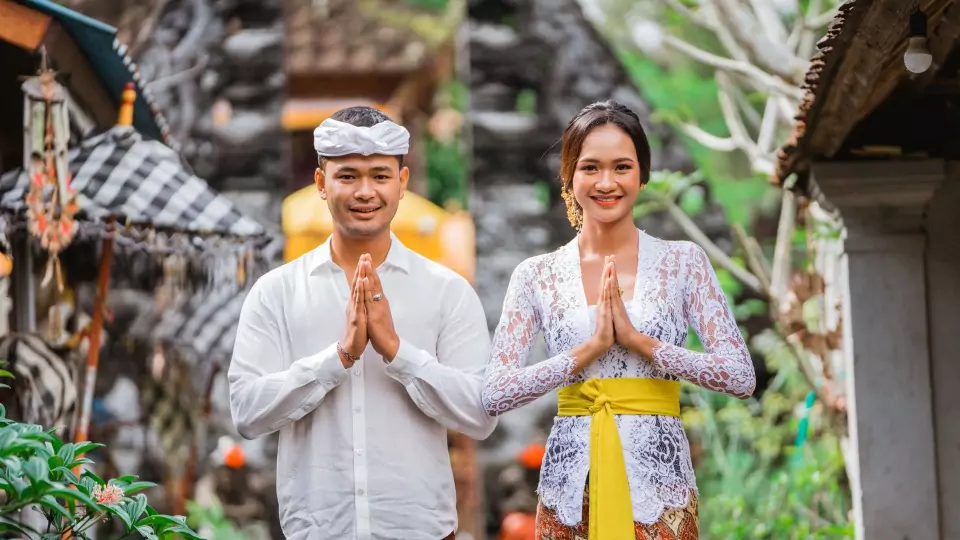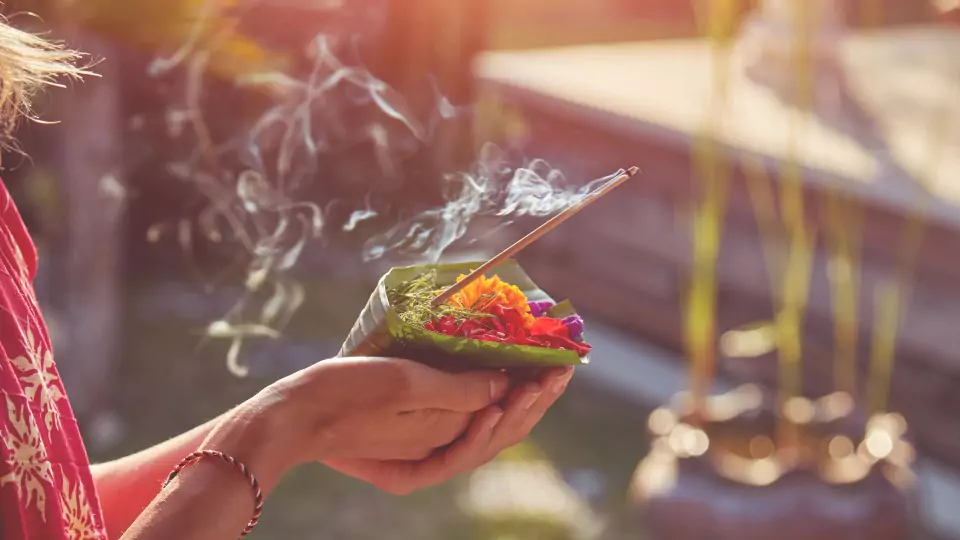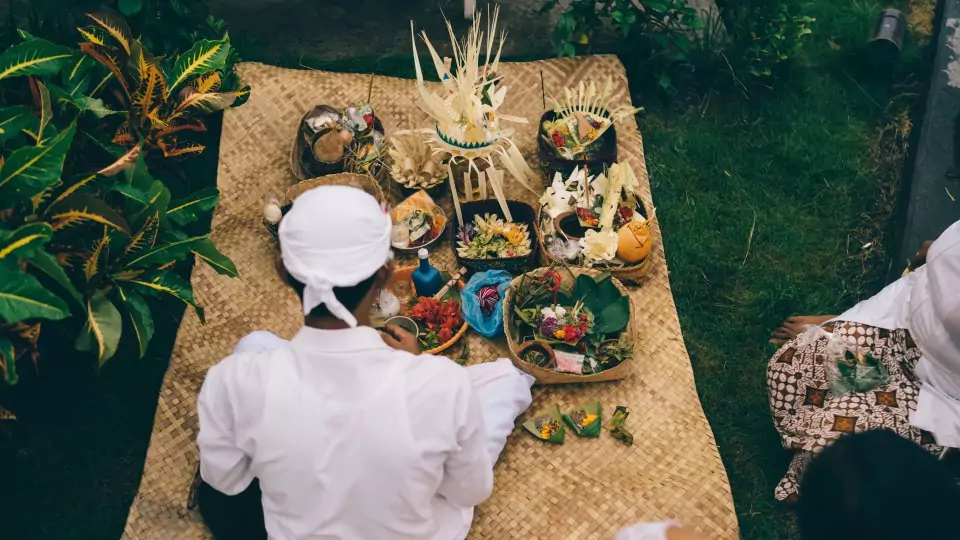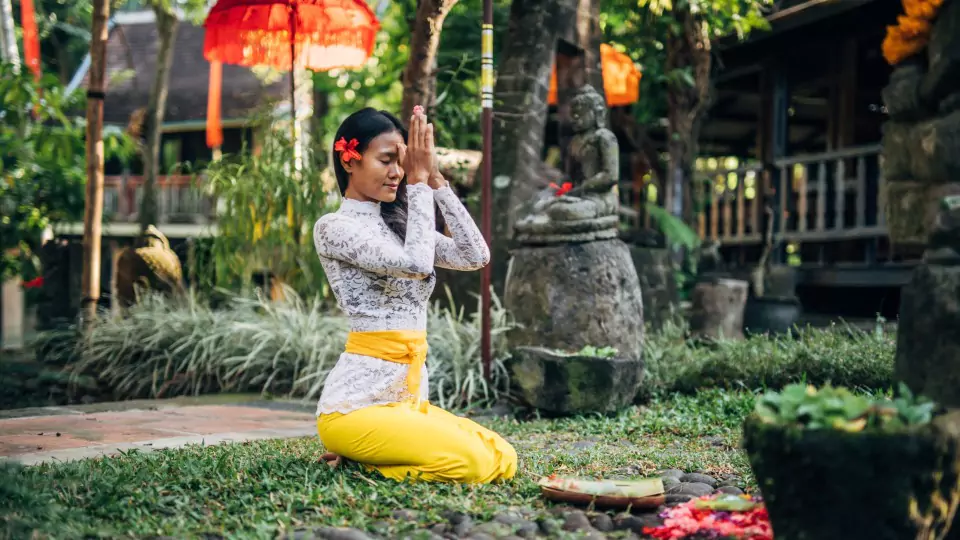Listen Instead? – Balinese Hinduism: A Unique Tradition
This article from ONAYA Resorts explores the unique form of Hinduism practiced in Bali. It explains its historical origins and development. It traces the roots of Balinese Hinduism back to the first century. The article highlights the influence of trade, migration, and the powerful Majapahit Empire from Java. It delves into the distinctive features of Balinese Hinduism. The article emphasizes its blend of Hindu and Buddhist elements, interwoven with local traditions. It also shows how Balinese Hinduism is deeply integrated into daily life. Offerings, festivals, and a focus on sustainability reflect its core values. The article underscores the resilience and adaptability of Balinese Hinduism. It highlights how it faces contemporary challenges.
Welcome friends! Today, let’s embark on a magical journey to Bali, a beautiful island renowned for its stunning beaches, breathtaking nature, and most interestingly, its unique Hindu culture. While most of Indonesia is predominantly Muslim, Bali stands out as a place where Hinduism flourishes. Have you ever wondered how that came to be? Let’s explore this vibrant tapestry of faith and tradition that colours every corner of Bali.
The History of Hinduism in Bali

Long ago, Bali wasn’t the tourist paradise we know today. Initially, it was a place where trade, empire expansion, and cultural exchange shaped the early canvas of Balinese Hinduism. This story begins in the first century, but significant changes occurred between the 5th and 6th centuries. During this time, traders and people migrating to Bali, mainly from India, brought their Hindu and Buddhist beliefs.
However, the Majapahit Empire was the game changer. Around the 14th century, this powerful kingdom from Java introduced its version of Hinduism and Buddhism to Bali. Imagine a massive cultural wave washing over the island, leaving behind a rich sediment of traditions, practices, and beliefs. That’s the impact the Majapahit Empire had on Bali. Moreover, even after the empire’s fall, many of its artists, priests, and intellectuals found a new home in Bali, further enriching its cultural landscape.
Exploring the Colourful Mosaic of Balinese Hindu Beliefs

Balinese Hinduism is not your typical form of Hinduism. Instead, think of it as a beautiful quilt made of different pieces—Hindu and Buddhist elements, interwoven with local traditions. It’s a fascinating blend that you won’t find anywhere else in the world. Furthermore, Balinese Hinduism is like a harmonious dance of various beliefs, deeply influenced by the island’s history and its people’s way of life.
Daily life in Bali is a constant stream of devotion. From the ‘Canang sari’ offerings placed everywhere as tokens of gratitude to the gods to the numerous festivals celebrating the divine, the communal, and the natural world—faith in Bali is vibrant and ever-present.

Balinese Hinduism: Standing Strong in a Modern World
In today’s fast-paced world, places like Bali are rare gems. Here, tradition and modernity are not at odds but dance together in harmony. Despite being part of a predominantly Muslim nation, Bali remains steadfast in its Hindu faith, a testament to the islanders’ resilience and love for their heritage.
The Future of Hinduism on the Island of Bali

As we enter the 21st century, Balinese Hinduism isn’t just surviving; it’s evolving. With a keen focus on sustainability and environmental care, the Balinese are demonstrating how traditional beliefs can address contemporary challenges, embodying the principle of living in harmony with the divine, society, and nature.
Wonderful Bali: A Conclusion
In essence, Bali offers more than just a visual feast for the eyes; it’s a living, breathing testament to the enduring spirit of Balinese Hinduism. It’s a culture rich in history, unique in its religious practices, and forward-looking in its approach to contemporary issues. This wonderful blend makes Bali truly special.
Frequently Asked Questions
Q: Why is Bali predominantly Hindu?
A: Bali is predominantly Hindu due to its historical influences, particularly from traders and the Majapahit Empire, which brought Hindu and Buddhist practices to the island. Additionally, the resilience of the Balinese people in preserving their heritage resulted in the unique form of Hinduism seen in Bali today.
Q: How is Balinese Hinduism different from Indian Hinduism?
A: Balinese Hinduism is a blend of Hinduism, Buddhism, and local animist beliefs, making it distinct from the Hinduism practiced in India. Moreover, it incorporates a broader pantheon of deities and places a strong emphasis on rituals and offerings to spirits.
Q: How has Balinese Hinduism adapted to modern challenges?
A: Balinese Hinduism has embraced principles of sustainability and environmental care, reflecting its foundational belief in harmony among the divine, society, and nature. This approach helps address contemporary challenges like climate change.
Q: What role do festivals play in Balinese Hinduism?
A: Festivals play a significant role in Balinese Hinduism, reflecting the religion’s communal spirit and the island’s deep respect for the divine, the natural world, and ancestors. These events are a vibrant expression of faith and community life.
There you have it! A glance into the heart and soul of Bali, an island where Hinduism paints every day with strokes of devotion, tradition, and colourful culture. Isn’t it fascinating how a place can hold onto its past while boldly stepping into the future? That’s the magic of Bali for you.
Learn 3 Balinese Hinduism Facts That Will Change Your Perspective on Spirituality
Book your stay with us here and start you Bali Journey 🙂

